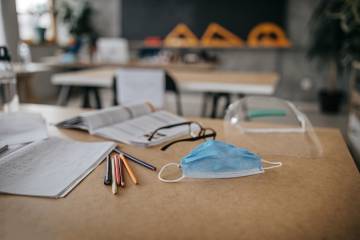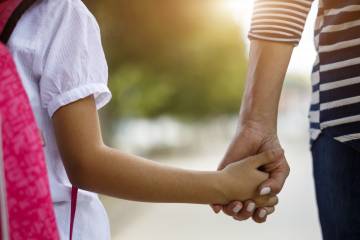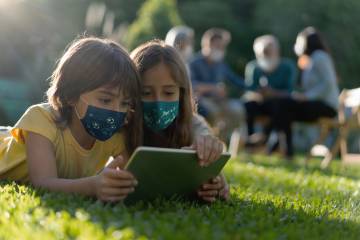As many students of all ages return to in-person classes for the first time in over a year, the normal pressures and anxieties of school are compounded by the fourth wave of the coronavirus pandemic and all the accompanying physical and mental health concerns. In a recent Facebook Live discussion, three experts from Johns Hopkins offered advice for parents navigating through this difficult landscape, including red flags to watch for and the latest tips on masks.
"Parents are creative and resilient, and we can find fun things for our kids to do, even in this pandemic, and we did that last year," said Aaron Milstone, a pediatric infectious disease specialist at the Johns Hopkins Children Center in Baltimore "Even in this fourth wave, even as we go through the winter, parents need to set a positive tone for their kids."
Some takeaways from their Sept. 3 talk:
When should you seek medical attention for symptoms of illness in kids?
"What you're looking for, hoping not to see, is your child being listless, not responding the way they should," said Allison Agwu, an infectious disease specialist the Johns Hopkins Children Center. "They're coughing so much they can't catch their breath, they're turning blue, the fever is not breaking, there's any mental status changes, any diarrhea or nausea to the point they're not tolerating food." The sense of fatigue, she emphasized, can be a "profound one."
Milstone said parents should feel comfortable seeking medical attention or advice whenever they're worried. "There's no harm in calling, scheduling an appointment, and getting checked out," he said, adding that testing for COVID-19 is particularly important this year. "We really need to know if kids have COVID, so that we can appropriately keep them away from their family members and other students to keep the community safe."
What mental health warning signs should parents watch for?
Though the red flags can vary by age group, any changes in sleep patterns and appetite, or loss of interest in previously enjoyed activities, are always cause for concern, according to pediatric neuropsychologist Jennifer Katzenstein, co-director of the Center for Behavioral Health at the Johns Hopkins All Children's Hospital in Florida.
With young children in preschool and kindergarten, watch for regressions in behavior, increased tantrums, more difficulty with separation from parents, and changes in toileting, she said.
For elementary schoolers and preteens, she said, look for avoidance of school, friends, and activities, as well as more destructive and irritable behaviors.
Irritability is also a warning sign with high-schoolers, and sometimes difficult to distinguish from normal teenage moodiness. Pay attention to new excesses: "If they're easily set off, if you feel like you're walking on eggshells," Katzenstein said. Additionally, signs of hopelessness, nervousness, worry, and depression should receive attention.
What's the best mask for kids?
It's less important to focus on the type of mask at this point than to find one that fits well, fully covering the mouth and nose, the experts said. "The mask as a barrier is most important," Milstone said.
Agwu said to look for something "comfortable, that's made of a material that's breathable, that [kids] can work with" and buy multiples to serve as backups.
How often should masks be changed or washed?
"Aim to change it at least a couple times of week," Agwu said. "If you use a mask two days in a row, it's fine … but if it's physically soiled, you should change it." She recommends kids bring one or two extra masks to school with them each day.
As the pandemic wears on, we've learned that the greatest risks come from direct interactions with other people, Milstone said, so there's less concern about switching masks often to avoid contamination. "It's become more of a hygiene thing," he said. "When you see the Dorito crumbs or something else, time to wash the mask."
Correction: The date of the original airing of this Facebook Live event was misstated in an earlier version of this article. The Hub regrets the error.
Posted in Health, Voices+Opinion
Tagged mental health, children's health, covid-19, back to school










